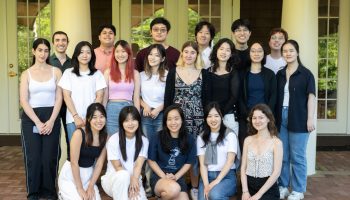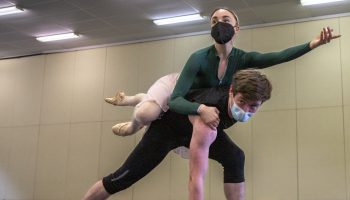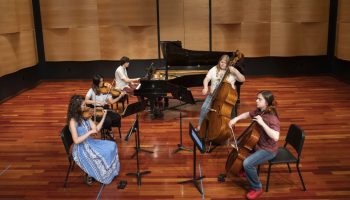
Fantasies are fanciful, seemingly untethered in their rhythm, form and inspiration. The musical term, more commonly known as “fantasia,” has consistently signified freedom, an absence of structure. Of all the f-words formerly mentioned — fanciful, free, form — one School of Music student said the foremost is “flair.”
“For fantasies, you don’t have to play like the composers and musicians who came before you,” said Joseph Brozek, a trumpeter and student from Northwestern University. “It’s not about emulating someone else’s sound, it’s about crafting your own.”
Brozek will bring his flair to the second School of Music instrumental recital of the season at 7 p.m. EDT Thursday, July 23, on the CHQ Assembly Virtual Porch. Joining him is cellist Katsuaki Arakawa, flautists Chi Ting and Lauren Scanio, and violinist Jason Hurlbut.
Brozek chose Jean-Baptiste Arban’s “Fantaisie Brillante” for the performance. Arban was a French composer of the 1800s, who is credited for proving the trumpet could be a solo instrument by developing its virtuoso technique.
“Fantaisie Brillante” was rearranged for a soloist by John Philip Sousa in 1885.
“The history of this selection is so important to know, because this piece helped put the trumpet’s sound on the map as a solo instrument,” Brozek said. “The composition showed all of the trumpet’s strengths and I think people began to develop a new appreciation for it after that.”
The variations throughout possess a breadth of different musical styles. It was composed in “theme and variations,” meaning it consists of a starting introduction, then a melody, or theme, followed by variations of that melody. The melody variations in “Fantaisie Brillante” employ triplet groupings, quadruple 16th-note groupings, and finally, the triple tonguing, used when a wind musician is required to play a fast passage in groups of three, Brozek said.
“It features many different techniques across the instrument and many different emotional shifts, too,” Brozek said. “From both a musical and a technical perspective, this piece gives a vast array of a lot of different things an audience can listen for.”
But that’s all “trumpet talk,” he said. At the end of the day, Brozek said what’s most important is ensuring each variation has “flair and personality.”
“That’s really my goal — to get my unique touch across,” he said.
Although he has had his eye on the piece for “quite some time,” Brozek said he learned it in its entirety online.
“Learning this piece and diving into it deeply was actually very effective over Zoom,” he said. “I was very fearful of the limits the online transition could cause for us, but frankly, it’s all working itself out.”
Lauren Scanio, flautist and student from The Juilliard School, will perform Georges Hue’s 1913 “Fantasie.” Hue’s “Fantasie” was set as a competition piece for the end-of-the-year exams at the Paris Conservatoire and displays the virtuosity of the modern boehm flute. It also served as an homage to Claude-Paul Taffanel, French flautist and founder of the French Flute School.
You can tell Hue really knew the flute when he wrote it, because it flatters the instrument well, — both in the virtuosic opening and ending, but also in the middle there are some beautiful long phrases that are aria-like,” Scanio said. “It’s golden, really.”
“This one is a favorite, so much so that flautists like myself are playing it 100 years later,” Scanio said. “That says something.”
As a classic “French Romantic piece,” Scanio said the piece includes long lyrical lines and technical passages that require a masterful implementation of dynamics and tone.
“You can tell Hue really knew the flute when he wrote it, because it flatters the instrument well, — both in the virtuosic opening and ending, but also in the middle there are some beautiful long phrases that are aria-like,” she said. “It’s golden, really.”
Though a classic, Scanio said there is a lot of room for variance in different “colors, dynamics and vibrato.”
“There are a lot of opportunities for variance in a fantasy like this; no two people play it exactly alike,” she said. “The challenge would be to come up with a way to play it that no one has heard before. I would like to think I’ve done that.”




